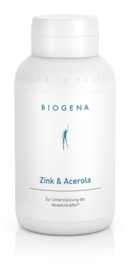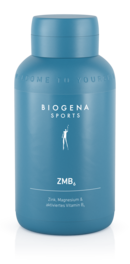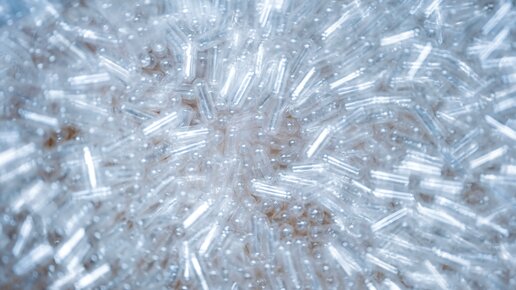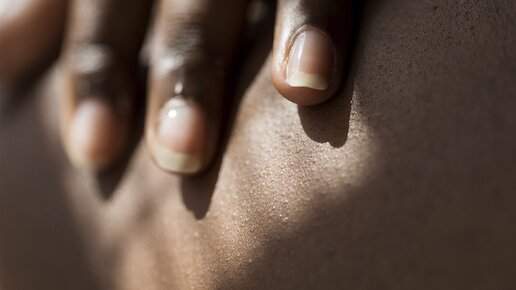Zinc is a versatile trace element involved in the unimpeded operation of numerous bodily functions. Despite its importance, the trace element can only be stored by our body in small quantities and must therefore be consistently supplied from the outside – via nutrition and, if necessary, nutritional supplements. But which foods contain zinc? And what’s the best way to take the trace element when needed? More in our micronutrient portrait today.
What is zinc?
In addition to iron, zinc is the second most common trace element in the human body. Around 70% of the body’s zinc content is found in bones, skin and hair. The other 30% are primarily distributed across the liver, kidneys and muscles. However, high concentrations are also found in the retina and iris of the eyes as well as in the male reproductive organs.
The role of zinc in the body
The body of an adult contains about 2 to 4 grams of zinc. These are relatively small amounts - hence the designation as a trace element. However, in order for the more than 300 zinc-dependent enzymes to function and the reactions involving them to run smoothly, the body must always have sufficient zinc available.
In contrast, there are two challenges: On the one hand, the human body can only store zinc briefly and in small quantities. On the other hand, the body cannot produce zinc itself. The necessary replenishment can therefore only be made from the outside – via food and, if necessary, also via nutritional supplements. The high strategic importance of zinc results from the wide range of processes that rely on zinc.
Function: Why does the body need zinc?
Examples of bodily functions to which zinc contributes:
- Normal cell division and DNA synthesis
- Protection of cells from oxidative stress
- Maintenance of normal skin and hair
- Normal protein, fat and carbohydrate metabolism
- Maintenance of normal testosterone levels in the blood
- Normal cognitive function
- Normal acid-base balance
- Normal fertility and reproduction
- Normal function of the immune system
Effect: Why a good supply of zinc is so important
Whether skin, hair nails, eyesight, immune system or bones, a good zinc supply supports their normal function. Cell division, protein production and fertility are also dependent on a good zinc supply. But why does the trace element have its hands in play in so many processes?
The background is that the trace element in our body is an important component or activator of countless enzymes – these are important reaction accelerators in our metabolic processes. They can only do their job smoothly if there is enough zinc.
The body as a zinc regulator
To a certain extent, the healthy human adult body is able to regulate zinc absorption automatically. If the need for zinc in the body increases due to specific stresses or during specific life situations, the body changes the way it deals with the food it receives. In these cases, it removes a correspondingly higher amount of the trace element from the food and eliminates less.
This allows the body to regulate its zinc balance over several days. But as with everything in life, this effect also reaches its limits at some point – for example, if the food you eat does not contain enough zinc or the increased requirement lasts for a longer period of time.
Who needs zinc?
First of all: everyone needs zinc. However, some groups of people should pay particular attention to the trace element. These include pregnant and breastfeeding women, as well as people who sweat a lot. Adequate zinc supply is also an important topic for children and adolescents. According to D-A-CH reference values, 10-year-olds already have the same zinc requirements as adult women (8 mg per day) – the trace element is essential for growth. Stress, infections or chronic diseases can also have an additional effect on the body’s zinc status. Likewise, the trace element with its numerous functions is particularly important in times of increased pressure, e.g. when you are under stress or undertaking sporting challenges.
Zinc daily requirement: how many mg per day?
Zinc uptake is highly dependent on phytate intake. Phytates are secondary plant substances that are always part of a diet rich in whole grains – they are often found in whole grains and legumes, for example. Phytates bind zinc to the gastrointestinal tract so that it can no longer be absorbed by the body. Accordingly, the diet has an effect on zinc requirements: high zinc absorption is present in diets where consumption of whole grain products and legumes is low and protein sources are primarily of animal origin. Absorption is reduced in diets where the consumption of whole grain products (mainly non-sprouted or unfermented) and legumes is high and the protein sources are primarily or exclusively of plant origin (e.g. soy) – the zinc intake should be correspondingly highest.
The following also applies: men and women are different when it comes to zinc. While women are advised to take 7-10 mg zinc per day depending on the amount of phytate intake, men in the same age group are advised to take 11-16 mg of zinc daily. However, this may be a little more for pregnant or breastfeeding women: in this special phase of life, the daily zinc requirement increases to 11-14 mg.
Zinc blood values. No half measures!
90% of zinc is present in red blood cells in the blood. In the event of insufficient supply, the body tries to keep the zinc concentration in the blood serum (= liquid part of the blood) stable for as long as possible. Zinc is removed from the red blood cells in which zinc depletion can be detected. To determine the zinc status, a whole blood analysis is therefore particularly recommended. In contrast to so-called serum diagnostics, it also includes red blood cells.
|
Méthode de détermination |
Plage de référence |
|
Zinc dans le sérum sanguin |
0,8 – 1,4 mg/l |
|
Zinc dans l'ensemble du sang |
7,0 – 8,0 mg/l |
Zinc in food: Where it is found
Good zinc sources include meat, offal, oysters, dairy products, eggs and fish. Plant-based zinc sources are less well utilised for various reasons (mainly due to the inhibitory phytic acid), which is why the aspect of zinc should be kept in mind, especially with vegetarian and vegan diets. Plant-based sources of zinc include spinach, oats, wholegrain products and wheat germ, pulses and nuts. For grain products, it must be ensured that the zinc content is high, especially in the husk and just underneath it. The zinc content of grain products therefore depends on their degree of milling.
Zinc as a dietary supplement
Zinc is a building block and activator of numerous enzymes that contributes to the maintenance of many biological processes. Since the body lacks significant zinc stores and cannot produce it itself, the trace element must be fed regularly from the outside. If necessary, nutritional supplements can also be used for this.
Zinc intake & dosage
When should you take zinc?
For optimal absorption, it is recommended to take between meals. Experience from practice shows that zinc tolerance depends on the daily rhythm. Therefore, it is recommended that sensitive patients take zinc in the evening or take it with meals.
High doses of zinc interfere with the absorption of iron, copper, calcium and selenium. Therefore, a time-delayed intake of mineral supplements at intervals of at least two hours is advisable.
How long should you take zinc?
How long zinc should be taken depends on several factors. To determine the ideal duration, you should consult your trusted medical professional. He or she may be able to recommend an appropriate duration of zinc intake with the help of a blood test.
How much zinc should you take?
The amount of zinc to be taken is determined individually by zinc status, age group and gender as well as the dosage of the respective zinc supplement. It is best to consult your doctor. The recommended zinc intake of the German Society for Nutrition ranges from 7-10 mg (women) to 11-16 mg (men) for adults.
Maximum daily dose
The EFSA (European Food Safety Authority) recommends a maximum of 25 mg zinc per day (UL value) from diet and zinc supplements as a safe upper intake amount with long-term intake. The maximum uptake dose (NOAEL) is 50 mg per day according to the Scientific Committee on Food.
Taking zinc with other micronutrients
Whether vitamin C, vitamin D, vitamin B6, folic acid or biotin – zinc can be taken with all vitamins. The case is somewhat different with certain minerals and trace elements, such as calcium, iron, copper and selenium. Although zinc can also be taken together with these elements, at higher doses, the trace elements can hinder each other in their uptake. Although a warning is also often issued for magnesium, an interaction has not yet been confirmed in studies. An interval of around 2 hours between taking zinc and mineral supplements is therefore recommended.
Scope of application
Zinc for children
In order for children to grow and thrive smoothly, their cells must be able to divide “like clockwork”. This is where zinc comes in, which supports the normal growth of children and adolescents through its function in cell division.
Zinc during pregnancy & if you want to have children
Where is growth more important than during pregnancy? Accordingly, zinc also plays a central role in pregnancy, which is also reflected in an increased zinc requirement of the expectant mother. However, enough zinc should also be ensured before pregnancy. Finally, the trace element contributes to normal fertility and thus plays a correspondingly important role in the fertility of men and women.
Zinc for men
Zinc is the male mineral par excellence. It thus contributes to normal blood levels of testosterone, the male sex hormone. The latter performs valuable work mainly below the belt, as it supports both libido and male sperm production.
Zinc and immune system for colds etc.
Zinc is considered an immune system booster. This trace element not only contributes to normal skin – which forms an important protective shield against intruders – it is also required for the formation and activation of various defence cells. In addition, zinc contributes to oxidative cell protection, an effect that also benefits our immune system.
Zinc for athletes
Special efforts require special support. It’s no wonder that zinc is also a concern for athletes. The trace element contributes to protein synthesis and to the maintenance of testosterone levels in the blood – both functions that are of particular interest to athletes.
Zinc & stress
People who are stressed can use nutritional support. The cells of exhausted individuals are more likely to form free radicals that cause oxidative stress. Zinc can help to protect the cells from oxidative stress. In addition, the increased metabolism of tired and exhausted people causes a higher acid burden. Zinc also helps maintain a normal acid-base balance.
Conclusion:
Alphabetically last, Zinc is at the forefront in terms of importance. Whether it’s cell division, fertility, immune system or skin, hair or nails – zinc helps keep our bodies running smoothly. This makes it all the more important to always keep an eye on good care.
Frequently asked questions about zinc
Regular zinc intake at recommended doses can provide many health benefits. The recommended daily zinc intake varies depending on age, gender and life situation. The recommended daily dose for adults is approximately 7-16 mg. Administration of up to 40 mg per day is considered safe. It is important not to exceed the recommended daily dose and to consult a doctor if necessary.
A lot of zinc is found in meat, especially beef and pork, as well as in seafood such as oysters. Nuts and seeds, such as pumpkin seeds and cashews, are also rich in zinc. Legumes such as lentils and chickpeas as well as whole grain products also provide significant amounts. Dairy products such as cheese and yoghurt also contribute to zinc intake.
Whether skin, hair, nails, eyesight, immune system or bones, a good zinc supply supports their normal function. Cell division, protein production and fertility are also dependent on a good zinc supply.
References:
https://www.dge.de/wissenschaft/referenzwerte/zink/, Zugriff: 11.07.2024
https://www.mikronaehrstoffcoach.com/de/at/mikronaehrstoffe/micronutrient.zink.html#Labordiagnostik , Zugriff: 9.7.2024.
Stiles, L.I. et al. 2024. Role of zinc in health and disease. Clin Exp Med. 2024 Feb 17;24(1):38.
N. Roohani, et al. 2013. Zinc and its importance for human health: An integrative review“, J Res Med Sci, Bd. 18, Nr. 2, S. 144–157, Feb. 2013.
Marktl, W. 2021. Zink – Funktion, Physiologie und Bedarf. Journal für Ernährungsmedizin, März 2021. https://jem.at/2021/ernaehrungsmedizin/zink-funktion-physiologie-und-bedarf/
R. L. Bailey, K. et al. 2015. The epidemiology of global micro nutrient deficiencies. Ann. Nutr. Metab., Bd. 66 Suppl 2, S. 22–33, 2015.
I. Elmadfa, Institut für Ernährungswissenschaften (Wien), Österreich, und Bundesministerium für Gesundheit, Österreichischer Ernährungsbericht 2012. Wien: Bundesministerium für Gesundheit, 2012.
N. Petry, I. Olofin, E. et al. 2016. The Effect of Low Dose Iron and Zinc Intake on Child Micronutrient Status and Development during the First 1000 Days of Life: A Systematic Review and Meta-Analysis. Nutrients, Bd. 8, Nr. 12, S. 773, Dez. 2016.
A. Malik, et. al. 2014. Zinc supple mentation for prevention of acute respiratory infections in infants: a ran domized controlled trial. Indian Pediatr, Bd. 51, Nr. 10, S. 780–784, Okt. 2014.
DeRuisseau K.C. et al. 2002. Sweat iron and zinc losses during prolonged exercise. Int J Sport Nutr Exerc Metab. 2002 Dec;12(4):428-37.
Sanusi, K.O. et al. 2021. Effect of maternal zinc deficiency on offspring health: The epigenetic impact. J Trace Elem Med Biol. 2021 May:65:126731.
Deutsche Gesellschaft für Ernährung e.V.: https://www.dge.de/wissenschaft/referenzwerte/zink/, Zugriff: 10.7.2024.












